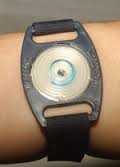Sweat Sodium
Specimen Volume
A minimum sweat volume of 15ul must be collected over a 25 minute collection period to meet the minimum sweat rate of 1.0g/m2/minTurnaround Time
1 daySample Stability
Samples may be stored in the fridge between 2° - 8°C for up to 72 hours if same day analysis is not possibleGeneral Information
Cystic Fibrosis is the most common serious genetic condition in Caucasians, with an incidence of approximately 1 in 2500 live births in the UK. It is a generalised disorder of excessive viscous exocrine secretions, due to impaired chloride transport across membranes caused by mutations in the CFTR gene. The main symptoms at presentation are recurrent chest and lung infections, cough and wheeze, failure to thrive, pancreatic insufficiency leading to malabsorption and male infertility.
Sweat chloride and conductivity/sodium concentrations are increased in cystic fibrosis, and their measurement provides the definitive test for diagnosis of cystic fibrosis.
Localised sweating is induced on the flexor surface of an arm by Pilocarpine iontophoresis (introduction if ions of soluble salts into the body by an electric current) using Pilocarpine gels. Sweat is collected by the Wescor Macroduct system, which collects sweat passively and automatically, driven by the same hydraulic pressure that causes sweat to move from the base of the sweat gland to the skin surface. After removing the Macroduct sweat collector, the sweat sodium and chloride are measured directly by ICP-MS using neat sweat.
Patient Preparation
- Sweat tests can be performed after 2 weeks of age in infants greater than 3kg who are normally hydrated and without significant systemic illness.
- Sweat tests can be attempted in term infants after 7 days of age if clinically important. However, it should be noted that the failure rate of sweat collections is higher than that of sweat tests carried out after 6 weeks of age. (Post term gestation 40/40) and will need repeating if an insufficient quantity of sweat is collected.
- Sweat tests should be delayed in subjects who are dehydrated, systemically unwell or who have eczema affecting the potential stimulation sites.
- Sweat tests should be delayed in subjects who are oedematous and/or on systemic corticosteroids.
- Sweat tests SHOULD NOT be performed in subjects who are on oxygen by an open delivery system. This would not apply to an infant on head box or nasal prong oxygen
Notes
From 08/11/2016 sweat analysis is performed by ICP-MS. There is no change to the interpretation of results.
Sweat tests are booked via the Clinical Chemistry office, Laboratory Medicine, Birmingham Heartlands Hospital.
There is one sweat test clinic per week - either adult or paediatric depending on demand. Adult clinics are held on Monday mornings, and paediatric clinics are held on Monday afternoons.
Reference Range
Sweat sodium is used as a check of the chloride result. Interpretation is as follows:
Cystic fibrosis unlikely < 50 mmol/L
Supports the diagnosis of CF > 90 mmol/L
The Sodium and Chloride concentrations should be within 20 mmol/L of each other.
Specifications
- EQA Status: NEQAS for Sweat Analysis
- EQAS Scheme: Yes








